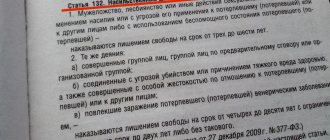Sexual crimes against minors, unfortunately, continue to remain in the leading position among all offenses in Russia. Statistics show that in the period from 2010 to 2016 alone, the number of such acts increased 2.5 times. This is a rather scary statistic that requires a review of penalties for this type of crime against children.
In the Criminal Code of the Russian Federation, for actions of a sexual nature by subjects who have reached 18 years of age, with persons under 16, 14 and 12 years of age, liability arises under Article 134 of the Criminal Code. In this publication, we will examine in more detail such questions - what kind of article this is, what punishment is given for actions committed with minors, what the latest changes have been and other points.
Article 134 of the Criminal Code of the Russian Federation - corpus delicti
The Constitution of the Russian Federation guarantees every citizen of the country personal integrity, and also gives the right to freedom of choice, a decent life and development. In 1959, the Declaration of the Rights of the Child was adopted, according to which all children have the right to protection of their interests, as well as to protection and care. Any attack on a minor, including for sexual reasons, must be strictly suppressed by law.
Free legal consultation by phone:
8
According to Art. 134 of the Criminal Code of the Russian Federation, the corpus delicti provided by law is as follows:
- in part one - sexual intercourse committed by a subject whose age is more than 18 years in relation to a person who has not reached puberty under the age of 16 years;
- in part two - the sexual nature of acts between an adult gay person and a child under 16 years of age;
- for the third part - for the obviousness of the signs of Part 1 and Part 2, but the victim is between 12 and 14 years old;
- under Part 4 - committing acts provided for in Parts 1, 2, and 3 in relation to two or more children;
- under Part 5 – group actions described in Parts 1, 2, 3 and 4;
- under Part 6 - acts falling under the qualifications of Part 3, but committed by a previously convicted person.
Formal elements of the crime
The crime is formal in nature if the perpetrator himself has not reached the age of 18, and the victim, for example, is a sixteen-year-old subject.
In addition, liability for an action does not occur if the person who committed it and the injured party filed an application with the registry office. According to the Resolution adopted at the Government Plenum, a marriage license in this case must be obtained from the municipal authorities. In some regions it is given by the mayor's office, in others - by the governor himself.
Statute of limitations under Article 134
Statute of limitations under Art. 134 is 6 years from the moment the crime was committed (p. 78 of the Criminal Code of the Russian Federation), since it relates to acts of moderate severity.
Latest amendments to s. 134 were included in the Federal Law on July 27, 2009.
What basic principles does Article 135 of the Labor Code of the Russian Federation contain?
Art. 135 of the Labor Code of the Russian Federation reveals the principles on the basis of which one of the essential conditions of an employment agreement is determined: the salary of a specific employee. Its value depends on the employer’s established:
- A remuneration system enshrined in internal regulations consistent with current labor legislation, approved by the labor collective (collective agreement) and the trade union body (if there is one). The system can also be departmental or sectoral. For budgetary institutions, it is largely determined by recommendations adopted at the national and regional legislative level.
- A staffing table drawn up on the basis of the approved wage system and containing specific salary figures (rates, salaries) related to a specific position (Article 132 of the Labor Code of the Russian Federation). The salaries of the head of the employer, his deputies and the chief accountant are not subject to restrictions on the staffing table (Article 145 of the Labor Code of the Russian Federation), depending either on legally established rules (for heads of budgetary institutions and legal entities with a predominant share of state participation in them), or on direct agreements enshrined in employment contracts (for all other legal entities).
- The working conditions of a particular employee included in the text of the employment agreement with him. This agreement, in turn, is based on the provisions contained in the above paragraphs.
It should be borne in mind that when drawing up each of the above documents, the main approach to their content must be observed, implying that the employee’s position cannot worsen in comparison with:
- labor legislation when developing a remuneration system, a collective agreement and any of the internal regulations related to remuneration;
- departmental or industry standards when the employer adopts an internal regulatory document additional to these standards;
- labor legislation and any of the internal regulations relating to remuneration issues when drawing up a specific employment contract.
Punishment under Article 134 of the Criminal Code of the Russian Federation
Punishment under Article 134 of the Criminal Code of the Russian Federation:
- under Part 1 – from 480 hours of correctional labor to imprisonment for up to 4 years;
- according to Part 2 – forced labor up to 5 years. (minimum punishment) – up to 6 years. prisons (maximum);
- under part 3 – deprivation of the right to a certain type of activity for a period of up to 15 years. — imprisonment from 3 to 10 years;
- according to Part 4 – from 8 to 15 l. behind bars;
- according to part 5 – from 12 to 20 liters. bondage;
- according to part 6 – from 15 to 20 l. prison stay.
The verdict comes into force after its announcement. Within a certain period, the defendant can appeal it to the Supreme Court of Russia.
The maximum prescribed term for Article 134 is 20 years in prison.
The person who committed the crime has not reached the age of 16 is punished by law
If the person who committed the illegal acts has not yet reached the age of 16, then no punishment will be imposed, since the person involved is himself a minor. However, if there were violent actions on his part, then he can be convicted of rape under s. 131st Criminal Code.
What does the Labor Code include in salary?
Analysis of the texts of articles of the Labor Code of the Russian Federation related to wages allows us to say that it includes:
- The actual salary (salary or rate), depending on the qualifications of the employee, the complexity, volume and quality of his work (Article 132 of the Labor Code of the Russian Federation). For employees of budgetary institutions, the minimum wage is established by the Government of the Russian Federation (Article 144 of the Labor Code of the Russian Federation),
- Compensatory additional payments for work carried out under special conditions (Article 129 of the Labor Code of the Russian Federation). The legislation obliges such additional payments to be made (Articles 146-149, 151-154 of the Labor Code of the Russian Federation), determining the minimum permissible amount, but not limiting the maximum that the employer himself can set.
- Incentive payments (additional payments, allowances, bonuses) that encourage effective work (Articles 129, 135 of the Labor Code of the Russian Federation). Some of these additional payments are established by law, but the main role in their development is given to the employer. Moreover, bonuses and incentive payments can be used simultaneously.
Each of these components requires the development of a separate internal regulatory document that describes in detail the mechanism and criteria for its application. Usually this is a set of acts called provisions:
- about wages;
- on compensatory surcharges;
- about bonuses;
- about incentive payments.
Each of them can be an independent document, but can also serve as an annex to a collective agreement.
Read more about incentive payments in the material “Regulations on incentive payments with performance criteria” .
Is it acceptable to differ in salaries for one position?
Work of equal value must be paid equally (Article 22 of the Labor Code of the Russian Federation). Therefore, the basic salary (salary, rate) for employees occupying the same position and performing the same work should be the same (Articles 129, 132 of the Labor Code of the Russian Federation). In particular, this applies to employees undergoing testing when hiring (Article 135 of the Labor Code of the Russian Federation prohibits worsening wage conditions in comparison with those established by the current wage system).
However, employee indicators such as:
- qualification;
- business qualities;
- complexity of the work;
- volume and quality of work.
These indicators allow (Article 132 of the Labor Code of the Russian Federation) to pay differently for the results of the work of employees assigned to the same position. This is achieved through the use of bonus systems and incentive additional payments, which will make the incentive part of each employee’s salary individual, and as a result they will receive different total amounts for the same period.
Moreover, depending on qualifications, the basic salary initially for the same position may be different (Article 132 of the Labor Code of the Russian Federation). Only the difference in qualifications should be reflected in the job titles, and the difference in the range of responsibilities - in job descriptions.
Article 135. Return of the statement of claim (Civil Procedure Code of the Russian Federation)
- home
- Laws
- Civil Procedure Code of the Russian Federation
1. The judge returns the statement of claim if:
1) the plaintiff has not complied with the pre-trial dispute resolution procedure established by federal law for this category of disputes or the pre-trial dispute resolution procedure provided for by the parties, or the plaintiff has not submitted documents confirming compliance with the pre-trial dispute resolution procedure with the defendant, if this is provided for by federal law for this category of disputes or the agreement;
1-1) the stated requirements are subject to consideration in the order of writ proceedings (clause 1-1 was introduced by Federal Law of March 2, 2016 N 45-FZ - Collection of Legislation of the Russian Federation, 2016, N 10, Art. 1319);
2) the case is not within the jurisdiction of this court;
3) the statement of claim was filed by an incapacitated person;
4) the statement of claim is not signed or the statement of claim is signed and filed by a person who does not have the authority to sign it and present it to the court;
5) in the proceedings of this or another court or arbitration tribunal there is a case regarding a dispute between the same parties, on the same subject and on the same grounds;
6) before the court issued a ruling on accepting the statement of claim for court proceedings, the plaintiff received an application for the return of the statement of claim.
2. On the return of the statement of claim, the judge issues a reasoned ruling, in which he indicates which court the applicant should apply to if the case is not within the jurisdiction of this court, or how to eliminate the circumstances that impede the initiation of the case. The court ruling must be issued within five days from the date of receipt of the application by the court and delivered or sent to the applicant along with the application and all documents attached to it.
3. The return of the statement of claim does not prevent the plaintiff from filing a lawsuit again with the same defendant, on the same subject and on the same grounds, if the plaintiff eliminates the violation. A private complaint may be filed against the judge’s decision to return the application.
open a section in a document find materials
Article 134. Refusal to accept a statement of claim
Article 135. Return of the statement of claim
Article 136. Leaving the statement of claim without progress
Questions and answers on Article 135
#61125 15.10.2021 (07:55)
They don't accept the claim
I filed a statement of claim with the magistrate for the collection of arrears in payment for living quarters—the claim was returned to me based on Art. 135, 122 - The Code of Civil Procedure of the Russian Federation returned the claim to me and I must first file an application for a court order - and if only they refuse - along with this refusal or cancellation of the court order, I must re-file the statement of claim, but I do not want to apply for a court order , and they oblige me to do it. What to base your case on when filing a private complaint?
Author: Illarionova Replies: 7 Reply Read more
#58420 26.04.2021 (17:25)
How to pick up an application
Good afternoon On April 16, I filed a statement of claim for divorce, and 10 days later I reconciled with my husband. How can I withdraw my application?
Author: Olga Replies: 6 Reply Read more
#56917 24.12.2020 (11:00)
Re-applying to court
Can I file a claim again against the same person on the same subject, but on a different basis and add new evidence?
Author: Anna Replies: 6 Reply Read more
#52292 20.03.2020 (23:40)
What's wrong with the Judge?
Good evening. I won't go deeper into the weeds. I filed a civil lawsuit with a request to obtain evidence of “personal correspondence on VKontakte,” indicating that I cannot receive it certified in an authentic form, since this can only be done by authorized persons, in accordance with the resource’s confidentiality policy, based on Art. 13. Code of Criminal Procedure of the Russian Federation, I also cannot do this, according to Art. Civil Code 152.2, and Criminal Code. RF 138 Attached is a printout of the negotiations. the return arrives with a covering letter: Quote “As part of the specified statement of claim, you provided correspondence as evidence. This correspondence does not meet the requirements for admissibility of evidence, as it contains obscene language, which is unacceptable, and therefore must be returned.” All! in the Notice of Refusal of the Petition “... In this case, there are no grounds for granting the petition. No evidence was presented to the court confirming the difficulty of the plaintiff obtaining information on his own.” Okay, I’ll rewrite the Petition! With details and comments on each item! But what kind of “rebound” is this with the presence of swear words in correspondence? I have not found any provisions regarding this regarding the requirements for the admissibility of evidence; the presence of obscenities in the “doc base” is impossible to remove, since it violates the authenticity of the dock base itself! according to her logic, if there is a video of the rape of the victim in the “doc database”, ... what.. The court will not accept this material as containing pornographic scenes? How to kick it all back? more precisely, she is interested in how in the accompanying letter, very gently, but quite clearly, point out her “to put it mildly, dubious motive for refusing to accept the “evidence” (which, by the way, will not yet be direct until a judicial request is made) ... As well as the actual absurdity of refusal to request evidence... some kind of nonsense
Author: Andrey Replies: 3 Reply Read more
#50232 11.01.2020 (20:41)
How to recover money for paid services
The magistrate's court returned the statement of claim (refusal), since the plaintiff did not provide a verdict recognizing the plaintiff as a victim. A claim for consumer protection, a tourist package was paid for, but the company did not fulfill its obligations, closed and there is no contact with it. The director of the company received the claim itself and all the agreements and payment documents by registered mail with an attachment. A private complaint can be filed against the Magistrate's Court in the city court, through the magistrate's judge. within 15 days. What does “a verdict recognizing the plaintiff as a victim” mean? How can I prove this?
Author: Alexander Replies: 13 Reply Read more
Useful information and samples on Article 135
225 0
20.05.2015
Objection to the city court regarding the cassation appeal
Group: Samples: Objections and reviews Author: Site Administrator
More details
253 0
08.05.2015
Private complaint against a district court ruling to return a statement of claim, sample
Group: Samples: Private complaints against court rulings Author: Site Administrator
More details
183 0
08.05.2015
Private complaint against the decision of the city court
Group: Samples: Private complaints against court rulings Author: Site Administrator
More details
How does the salary compare to the minimum wage?
The minimum wage is the minimum monthly wage for work that an employee who has worked fully for a month and completed the entire required amount of work should receive (Article 133 of the Labor Code of the Russian Federation). In its meaning, this definition correlates with the amount of the basic salary (salary, rate), which is discussed in Art. 129 of the Labor Code of the Russian Federation and which does not include either incentive or compensatory additional payments.
Thus, only one component of the salary cannot be below the minimum wage - the basic one, that is, the salary or rate. However, a person can earn a smaller amount in a month if he has not fully worked this period.
The minimum wage is a value that has 2 meanings: all-Russian and regional (Article 133.1 of the Labor Code of the Russian Federation). The regional minimum wage may differ markedly from the all-Russian one, and in the regions, employers (if the legal entity is not financed from the federal budget) should be guided by it.
Read about one of the cases of the need for additional payment up to the minimum wage in the article .
” You can find more complete information on the topic in ConsultantPlus. Free trial access to the system for 2 days.
Second commentary to Art. 133 of the Criminal Code of the Russian Federation
1. Coercion means mental influence on the victim (victim) in order to force (him) her to have sexual contact with another person against her will. In this case, it is a way of suppressing the will and obtaining consent, albeit forced, to enter into a heterosexual or homosexual relationship, lesbianism, or to commit other actions of a sexual nature. Coercion may be expressed verbally, in writing or in any other form.
2. Blackmail involves the threat of disclosing information compromising the victim, intimidating him; threat of destruction, damage or seizure of property - expressed intentions to commit these actions (this must significantly affect the interests of another person in order to act as a factor suppressing his will); financial dependence - being in full or partial, but significant dependence on the perpetrator on legal grounds or with his voluntary consent; other dependence - any other dependence, except material, characterized by the lack of full or partial independence, freedom, the presence of subordination in service, work or study, etc.
3. The subjective side is characterized by direct intent.
4. The subject of the crime is special when it comes to the victim (victim) who is (is) in financial or other dependence; in all other cases - a person (regardless of gender) who has reached the age of 16.
5. The concept of a minor (minor) is revealed in the same way as in other crimes.










